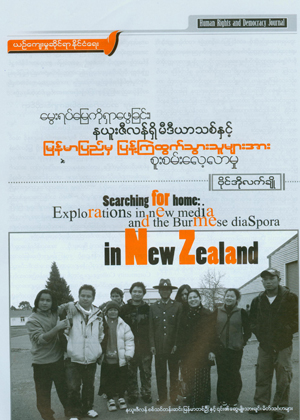
This study examines ways in which Burmese diasporic identities are formed and maintained, and the importance of new media in this process. Political oppression in Burma, the experience of exile and the importance of opposition movements in the borderlands make the Burmese diaspora a unique and complex group. This study used tapoetethakot, an indigenous Karen research methodology, to interact with 14 participants in Auckland, exploring aspects of new media use and identify maintenance.
 Common among all participants was a twin desire to share stories of suffering and to have pain recognised. This suffering is an important part of refugee identity and is also linked with resistance against assimilation in New Zealand. Instead, participants try and maintain their language and cultural practices, with the intent of returning to a democractic Burma in the future. New media supports these processes by providing participants with access to opposition media reports of human rights abuses and suffering, through making cultural and linguistic artifacts accessible and through providing an easy means of communication with friends and family in Burma and the borderlands.
Common among all participants was a twin desire to share stories of suffering and to have pain recognised. This suffering is an important part of refugee identity and is also linked with resistance against assimilation in New Zealand. Instead, participants try and maintain their language and cultural practices, with the intent of returning to a democractic Burma in the future. New media supports these processes by providing participants with access to opposition media reports of human rights abuses and suffering, through making cultural and linguistic artifacts accessible and through providing an easy means of communication with friends and family in Burma and the borderlands.
Karen journalist in critical force for change
Searching for home: Explorations in new media and the Burmese diaspora
Human Rights and Democracy Journal, Myanmar, 1(1), May 2013
Cho, Naw Violet (2009). New media and Burmese diaspora identities in New Zealand. Unpublished Bachelor of Communication Studies (Hons) dissertation, Pacific Media Centre, School of Communication Studies, AUT University. Catalogue@AUT Library


